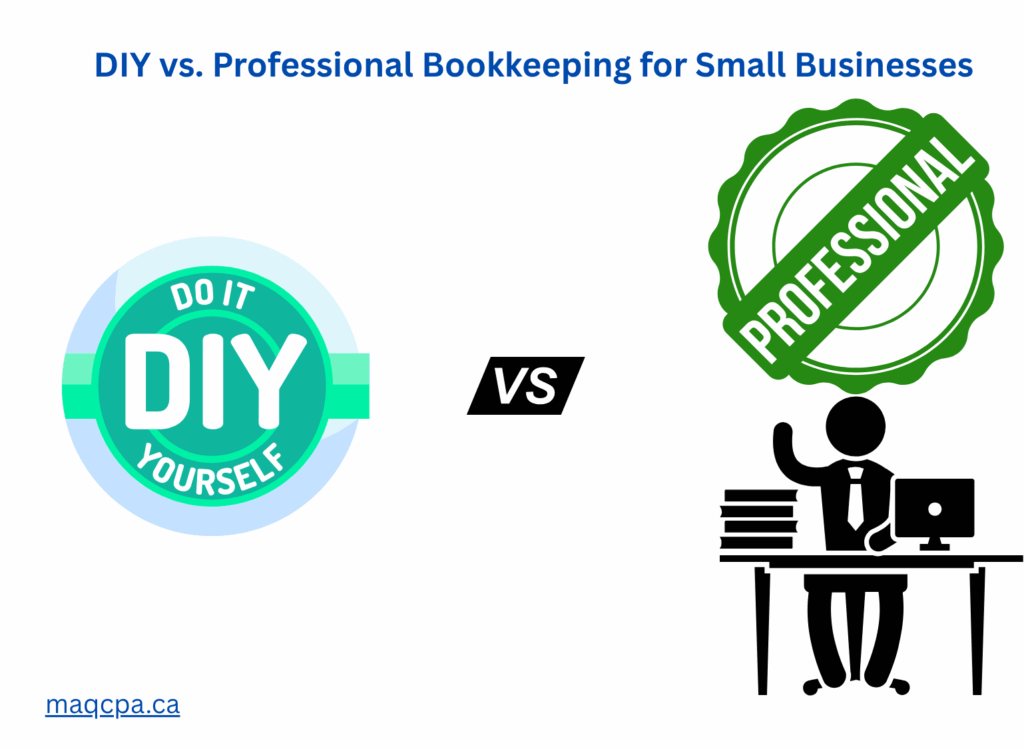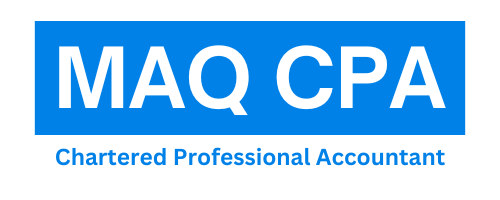For many small business owners in Canada, bookkeeping starts as a DIY effort: open a spreadsheet, track a few receipts, maybe try a free app. But as your business grows, so does the complexity — HST, payroll, contractor invoices, CRA compliance — and suddenly, your “quick bookkeeping system” isn’t so quick anymore.
So, what’s better: DIY bookkeeping or hiring a professional bookkeeper in Toronto?
This article will walk you through the pros, cons, risks, and costs of both, helping you make a confident decision that supports your growth — and protects you from tax-season headaches.

🗒️ Key Takeaways
- DIY bookkeeping is doable for very small operations but becomes risky as your business grows.
- Hiring a professional bookkeeper offers accuracy, CRA compliance, and peace of mind.
- The CRA requires all businesses to keep audit-ready records for six years.
- Cost isn’t just about money — your time and risk exposure matter too.
- Use a decision checklist to know when it’s time to outsource.
Why Bookkeeping Isn’t Optional in Canada
Under CRA guidelines, every Canadian business — whether incorporated or not — must keep complete records of income and expenses, plus supporting documents like receipts and bank statements.
You must:
- Keep records for at least 6 years
- Be able to prove every income and expense claim
- Track GST/HST collected and remitted
- Keep records in English or French
- Provide them on request if audited
Even if you’re a sole proprietor or freelancer, the CRA can audit your books.
🧾 Poor bookkeeping is one of the top reasons small businesses get reassessed during audits.
🛠️ DIY Bookkeeping: When It Works and When It Doesn’t
✅ When DIY Can Work
- You’re a sole proprietor with limited monthly transactions
- You’re using a single bank account for business
- You sell simple services (e.g. freelance writing, tutoring)
- You’re comfortable with spreadsheets or accounting software
- You have no payroll or subcontractor complexities
- You’re tracking your GST/HST carefully
DIY bookkeeping can work when things are simple and predictable — especially if you’re organized and financially disciplined.
❌ When DIY Starts to Fall Apart
- You collect HST but don’t reconcile it properly
- You start hiring subcontractors or employees
- You co-mingle personal and business expenses
- You miss categorizing deductible expenses (and lose write-offs)
- You struggle to keep up or hate doing it
- You’re worried about tax-time errors or penalties
👔 Professional Bookkeeping: What You’re Really Paying For
Hiring a bookkeeper isn’t just about offloading a task — it’s about buying back time, reducing risk, and staying compliant.
What a Professional Bookkeeper Offers:
- Accurate recordkeeping and bank reconciliations
- Expense categorization for maximum tax deductions
- GST/HST tracking and remittance preparation
- CRA audit readiness
- Financial reporting (profit & loss, cash flow)
- Monthly, quarterly, or annual check-ins
And most importantly: peace of mind.
⚖️ DIY vs. Professional Bookkeeping: Comparison Table
| Feature | DIY Bookkeeping | Professional Bookkeeping |
| Cost | Low or free | Monthly fee ($200–$500+/mo) |
| Time Required | 5–10 hrs/month | 0–1 hr/month (for meetings) |
| Accuracy Risk | High (manual errors) | Low (expert-managed) |
| Audit Protection | Limited | Strong CRA compliance support |
| Tax Deduction Optimization | Basic (often missed) | Maximized deductions |
| Software Costs | May need subscription | Need subscription or included in fee |
| Best For | Sole proprietors, side gigs | Incorporated businesses, growth-stage startups |
📂 CRA Requirements and Audit Risk
“The CRA doesn’t care who did your books — you’re responsible either way.”
Failing to track expenses, misreporting GST/HST, or not keeping receipts can lead to:
- Penalties and interest
- Denied expense claims
- GST/HST reassessments
- Stressful audits that can stretch months
Hiring a pro bookkeeper reduces this risk significantly. They understand how CRA thinks and what documents you’ll need.
📌 CRA Source: Keeping Records for Business
💸 Cost Breakdown: DIY vs. Hiring a Bookkeeper
Let’s compare the cost of both methods using a conservative estimate.
| Scenario | DIY Bookkeeping | Pro Bookkeeping |
| Software | $20–$50/month | $20–$100/month or included |
| Time Spent (5 hrs x $50/hr value) | $250/month (opportunity cost) | $0 (outsourced) |
| Tax Filing Errors or Missed Deductions | $0–$2,000/year | Minimal risk |
| Total Estimated Cost/Year | $3,000–$4,500 | $2,400–$6,000 |
💡 If your time is worth more than $50/hour, DIY may already be costing you more than hiring someone.
🧠 How to Decide What’s Right for You
✅ DIY Might Be Right If:
- You have fewer than 10 transactions/month
- You don’t collect HST/GST
- You enjoy tracking numbers and can stay organized
- You’re just getting started with minimal revenue
✅ Hire a Pro If:
- You have multiple income sources, HST, payroll, or subcontractors
- You’re spending more time worrying than working
- You’re preparing for funding, taxes, or incorporation
- You want year-round visibility and tax-saving strategies
Tip: You can start with DIY and upgrade to an expert bookkeeper as your business grows. Many bookkeeping firms also offer “cleanup” services for year-end or quarterly catch-ups.
FAQ – Small Business Bookkeepers Toronto / Scarborough / Markham / Mississauga
1. Is bookkeeping tax-deductible in Canada?
Yes — the cost of bookkeeping services and accounting software are eligible business expenses.
2. Can I switch from DIY to a professional bookkeeper mid-year?
Absolutely. Many bookkeepers will review and clean up past months to get you caught up.
3. Will I still need an accountant if I hire a bookkeeper?
Yes. A bookkeeper handles daily/monthly tracking. An accountant prepares year-end financials and tax filings.
4. What software do professional bookkeepers use?
Most use QuickBooks Online, Xero, Wave (Canada), or FreshBooks, depending on your business needs.
5. How often should I do bookkeeping?
Monthly is ideal for growing businesses. Quarterly may work for smaller operations.
Final Words & Next Steps
Bookkeeping may seem like a back-office task, but it’s central to your business health. Whether you’re just starting or already scaling, the right system (and the right support) can mean the difference between smooth sailing and CRA headaches.
👉 Ready to stop guessing and start growing?
Our team works with Canadian small business owners to clean up, set up, and stay on top of their books — all with CRA compliance in mind.
🔗 Book a consultation now — no obligation, just clarity.
Read about our small business bookkeeping services.
Disclaimer
The information provided in this blog is for general informational purposes only and does not constitute professional accounting, tax, financial, or legal advice. While we strive to ensure the accuracy and timeliness of the content, the information may not apply to your specific situation or reflect the most current legislative changes. Readers are strongly advised to consult a qualified professional before making any decisions based on the content of this blog. MAQ CPA and its representatives disclaim any liability for any loss or damage incurred as a result of reliance on any information provided herein.
